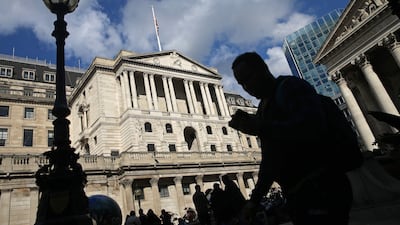The UK pensions system was brought to the brink of collapse during the economic commotion of the past week, it has been revealed.
This potential catastrophe was what compelled the Bank of England to step in with a £65 billion ($71.14bn) emergency bailout on Wednesday.
The central bank’s intervention, in which it bought up long-term gilts, came after it warned of a “material risk to UK financial stability” posed by plunging markets for UK debt.
Experts said the move was in response to a run dynamic, which saw Northern Rock collapse in 2008.
New chancellor Kwasi Kwarteng’s mini-budget, which included Britain's largest tax cuts in 50 years, sparked the latest financial chaos.
Prime Minister Liz Truss took to the airwaves on Thursday to defend the proposals, insisting it was the “right plan” for the country and economy.
Former Bank of England governor Sir Mark Carney warned the government on Thursday against undermining the country’s economic institutions.
He said it was “working at cross purposes with the bank” with its mini-budget.
“Unfortunately, having a partial budget in these circumstances — a tough global economy, tough financial market position, working at cross purposes with the bank — has led to quite dramatic moves in financial markets.”
His comments are the latest in a wave of international criticism and warnings about the government’s fiscal plans, including from the International Monetary Fund and ratings firm Moody’s.
How did it come to this?
It all began with the chancellor’s mini budget a week ago. Under the plan, the government said it would abolish the cap on bankers' bonuses and the top 45 per cent rate of tax for the biggest earners.
Thresholds for paying stamp duty were also increased, while a National Insurance increase introduced by Boris Johnson’s government will be reversed from November 6.
The market reaction was swift — and brutal.
The pound plummeted, eventually falling to its lowest-ever level against the dollar on Monday.
Speculation swirled that the Bank of England could impose an emergency interest rate rise in response.
It did not, in the end, choosing instead to issue a statement to say it would not hesitate to change interest rates to control inflation.
Yet, still the downwards economic spiral continued, with the FTSE falling below the 7,000 mark.
On Wednesday, the Bank of England was forced to intervene by buying up gilts — UK government debt in sterling ― after it “warned of a material risk to UK financial stability”.
The bank was forced to act after plunging markets for UK debt sent borrowing costs soaring and forced pension funds to dump their assets because they did not have enough short-term cash to honour some contracts.
Sources said the bank had begun to detect a “run dynamic”, with several pension funds facing mass defaults in funds in which they invest.
The Bank of England issued a statement this week that said it would not hesitate to raise rates to bring inflation, currently running at almost 10 per cent, back to its 2 per cent target.
The base rate now seems certain to treble between now and next year, from its current rate of 2.25 per cent, to about 6 per cent as the bank struggles to rein in inflation.
That could make mortgages unaffordable for many new — and existing — customers, as mortgage rates are even higher than the bank base rate.
Martin Lewis, a financial journalist and campaigner, says every £100,000 of mortgage equates to roughly £600 a year more for each 1 per cent interest rate rise.
“If UK rates rise to 6 per cent as some predict, mortgages would likely rise more than another 3 per cent again,” he said.
Defaqto, a financial comparison website, says almost 3,000 mortgage products have been withdrawn from the market this week. And more than 20 providers have withdrawn their entire fixed-rate mortgage rates.
The IMF on Tuesday said it was “closely monitoring” developments in the UK and urged Mr Kwarteng to “re-evaluate” his tax measures. It said, in an extraordinary statement, that the plans would increase inequality.
Meanwhile, Moody's said Britain's new fiscal policy regime was “credit negative”. It said a sustained confidence shock could permanently weaken the UK's debt affordability.
On Wednesday, in an attempt to allay fears, Mr Kwarteng met senior bankers, who said his November “medium-term fiscal plan” was too far away.
Ms Truss and her supporters have dismissed concerns about the government’s plans.
Speaking on local BBC radio on Thursday, after almost a week of silence, she said growth would not come about “overnight”.
“But what’s important is we are putting this country on a better trajectory for the long term,” she said.






































